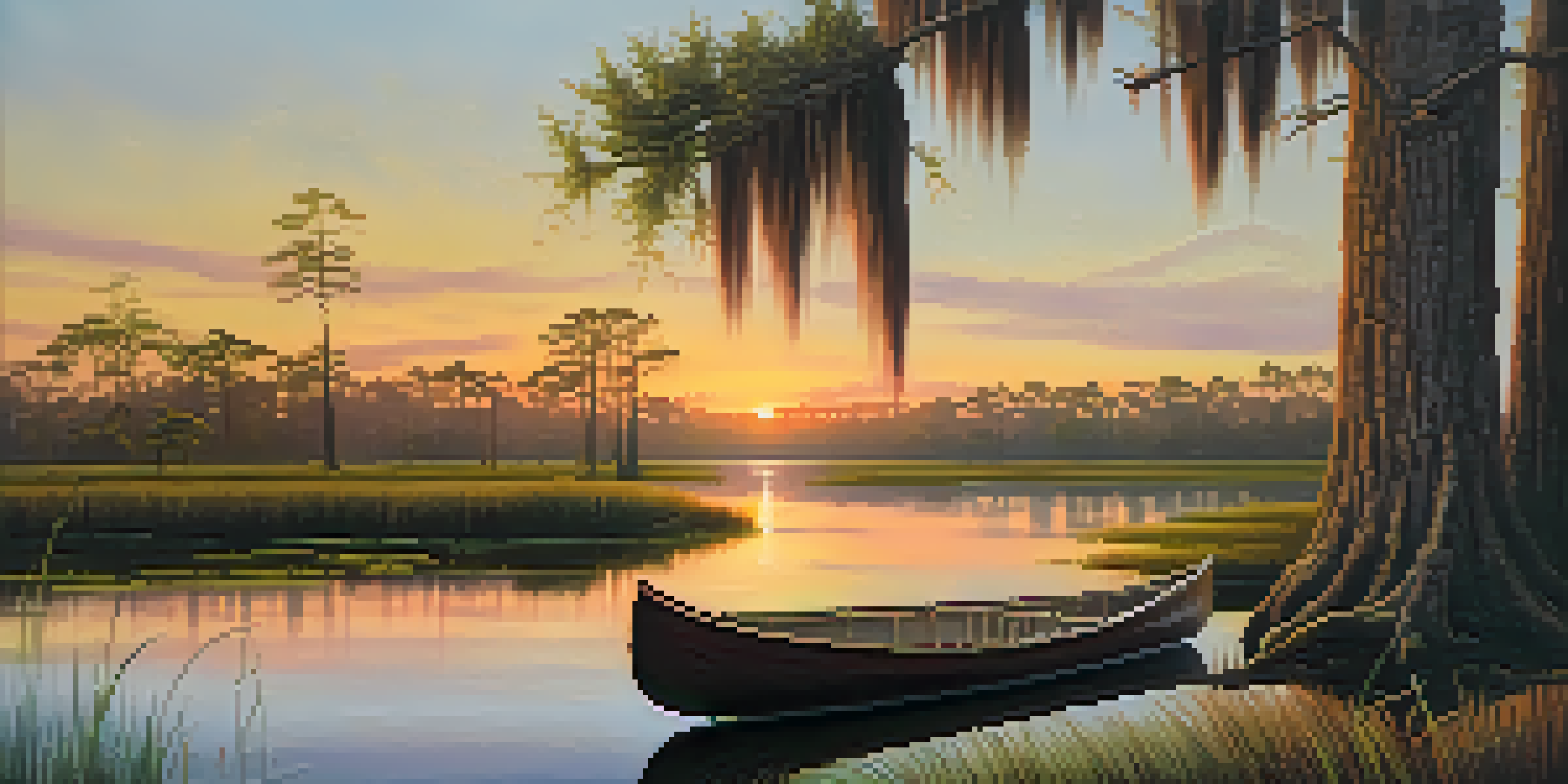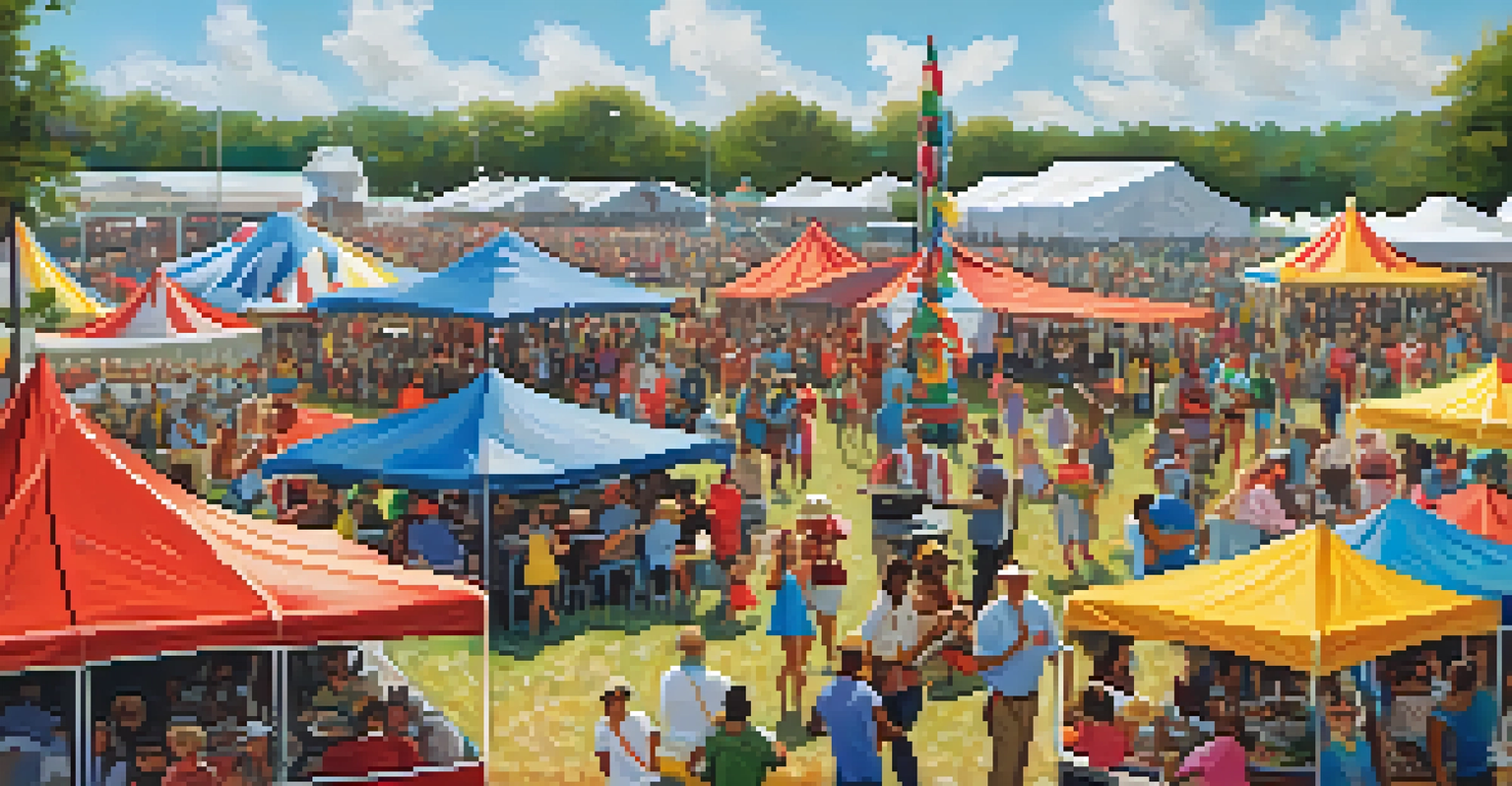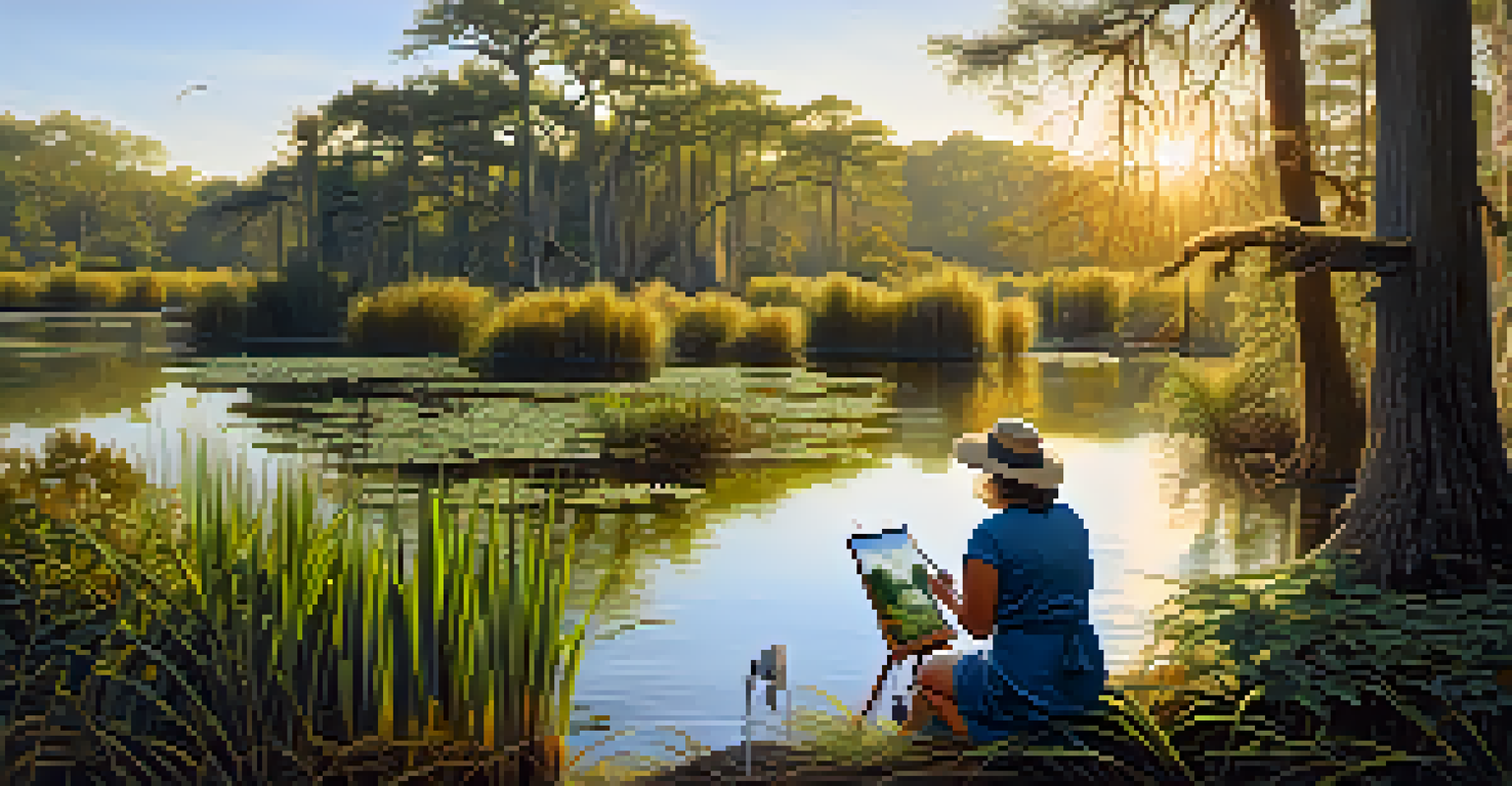Cultural Significance of Louisiana's Swamps and Wetlands

The Role of Swamps in Louisiana's Cultural Identity
Louisiana's swamps are more than just a backdrop; they are integral to the state's cultural identity. These wetlands have shaped the lives of the people who call this region home, influencing everything from their traditions to their cuisine. For many, the swamps are a source of spiritual connection, echoing the rhythms of life that have existed for centuries.
The land is the basis of all life and culture. It is the foundation of our identity as people.
The cultural identity tied to these wetlands can be seen in the vibrant music, art, and storytelling that flourishes in the area. From zydeco to jazz, the sounds of Louisiana often reflect the natural world, with local musicians drawing inspiration from the unique landscape. This connection fosters a deep sense of pride and belonging among residents, who view the swamps as a living part of their heritage.
Moreover, the swamps serve as a canvas for local artists, who depict the stunning biodiversity and intricate ecosystems. This artistic representation helps to preserve the stories and experiences of the people, ensuring that future generations understand the importance of the wetlands in shaping their cultural landscape.
Historical Significance of Louisiana's Wetlands
The history of Louisiana's swamps is rich and complex, intertwined with the narratives of indigenous peoples and early settlers. Indigenous tribes, such as the Houma and Choctaw, have long relied on these wetlands for sustenance and shelter, utilizing the natural resources for food, medicine, and materials. Their deep-rooted knowledge of the land has been passed down through generations, emphasizing the wetlands' importance to their culture.

As European settlers arrived, they brought their own customs and practices, further shaping the cultural landscape of Louisiana. The melding of these diverse traditions created a unique cultural tapestry that reflects the state’s history. Today, the stories of both indigenous peoples and settlers continue to resonate in the way communities interact with their environment.
Cultural Identity Tied to Swamps
Louisiana's swamps are deeply woven into the cultural identity of its residents, influencing music, art, and traditions.
Understanding the historical significance of these wetlands is crucial for appreciating the cultural narratives they embody. As we explore these stories, we gain insight into the resilience and adaptability of the communities that have thrived in harmony with the swamps, showcasing a deep respect for nature.
Ecological Importance and Cultural Practices
The ecological importance of Louisiana's swamps cannot be overstated; they provide critical habitats for countless species. This biodiversity is not only vital for the environment but also plays a key role in the cultural practices of local communities. Many residents engage in fishing, hunting, and gathering, relying on the swamps for their livelihoods and culinary traditions.
In every outthrust headland, in every curving bay, in every grain of sand there is the story of the earth.
For instance, the annual crawfish harvest is a significant cultural event in Louisiana, attracting locals and tourists alike. This tradition highlights the deep connection between the people and their environment, as families gather to celebrate, share meals, and pass down recipes. Such practices foster a sense of community and reinforce the importance of preserving these natural resources.
Additionally, the ecological knowledge passed down through generations enriches local culture. Elders often share stories about seasonal changes, animal behaviors, and sustainable practices, reinforcing the bond between the community and its environment. This intergenerational wisdom ensures that cultural practices remain relevant and respectful of the delicate ecosystems.
Festivals Celebrating Swamp Culture
Festivals play a significant role in celebrating and preserving the culture of Louisiana's swamps. Events like the Swamp Festival and Crawfish Festival bring together locals and visitors to honor the traditions that stem from these unique ecosystems. Attendees can enjoy local cuisine, music, and art, all while learning about the importance of the wetlands.
These festivals often feature activities that highlight traditional practices, such as cooking demonstrations and artisan markets. Local chefs showcase dishes that incorporate ingredients sourced from the swamps, allowing participants to taste the flavors of the region. This culinary celebration fosters a greater appreciation for the cultural significance of the wetlands and the people who rely on them.
Historical Roots of Wetland Cultures
The history of Louisiana's swamps reflects the intertwined narratives of indigenous peoples and early settlers, shaping the region's cultural landscape.
Moreover, festivals serve as a platform for raising awareness about environmental issues facing the swamps. Through workshops and discussions, attendees can learn about conservation efforts and the importance of preserving these vital ecosystems. By combining celebration with education, these events help to ensure that the cultural significance of Louisiana's swamps is recognized and protected for future generations.
The Impact of Climate Change on Wetland Cultures
Climate change poses a significant threat to Louisiana's swamps, impacting both the environment and the cultures that depend on them. Rising sea levels, increased flooding, and saltwater intrusion can disrupt the delicate balance of these ecosystems. As the landscape changes, so too do the cultural practices that have been passed down through generations.
Many local communities are feeling the effects of these changes firsthand, as traditional fishing and hunting grounds become compromised. This shift not only affects livelihoods but also disrupts the cultural transmission of knowledge and practices. As elders lose access to their ancestral lands, there is a risk that valuable wisdom about the swamps may be lost.
However, many communities are actively seeking solutions to adapt and preserve their cultural practices. By embracing sustainable practices and advocating for environmental protections, residents are working to ensure that their cultural heritage remains intact. This resilience is a testament to the deep connection between the people and their wetlands, emphasizing the importance of safeguarding these ecosystems.
The Spiritual Connection to Louisiana's Swamps
For many Louisianans, the swamps hold a profound spiritual significance, serving as a place of reflection and connection to nature. The serene landscapes, filled with cypress trees and moss-draped branches, provide a tranquil setting for contemplation and renewal. This spiritual bond is often reflected in local folklore, music, and art, showcasing the wetlands as more than just physical spaces.
Local beliefs and practices often incorporate elements of spirituality, with many residents finding solace in the swamps' beauty. The connection to the land fosters a sense of belonging and identity, as individuals draw inspiration from the natural world around them. This relationship is a reminder of the interconnectedness of life and the importance of respecting nature's gifts.
Impact of Climate Change on Traditions
Climate change threatens both the ecological balance of Louisiana's swamps and the cultural practices of communities that rely on them.
Moreover, community rituals and gatherings often take place in these natural spaces, reinforcing the spiritual significance of the swamps. From seasonal celebrations to quiet moments of prayer, these practices highlight the role of the wetlands in the cultural and spiritual lives of the people. This deep-seated reverence for the environment underscores the need to protect and preserve Louisiana's unique ecosystems.
Preserving Louisiana's Wetlands for Future Generations
As we explore the cultural significance of Louisiana's swamps, it is essential to recognize the need for preservation. The unique ecosystems that support the rich cultural heritage are under threat from various environmental challenges. By prioritizing conservation efforts, communities can ensure that future generations can continue to connect with and draw inspiration from these vital landscapes.
Engaging in sustainable practices, such as responsible tourism and habitat restoration, can help protect the delicate balance of the swamps. Community-led initiatives and partnerships with environmental organizations are crucial in advocating for the preservation of these ecosystems. By working together, residents can amplify their voices and promote awareness of the cultural and environmental importance of the wetlands.

Ultimately, preserving Louisiana's swamps means safeguarding the stories, traditions, and identities of the communities that rely on them. By fostering a sense of stewardship among residents and visitors alike, we can ensure that the cultural significance of these wetlands endures. It is through collective action that we can honor the past while nurturing a sustainable future for the swamps and the vibrant cultures they support.